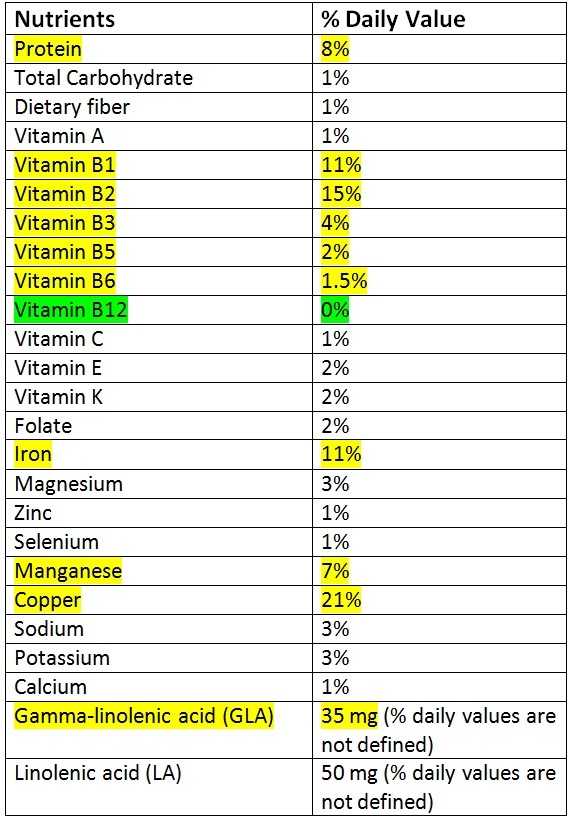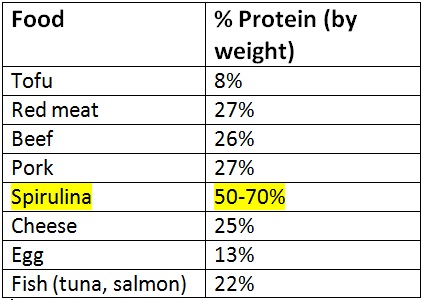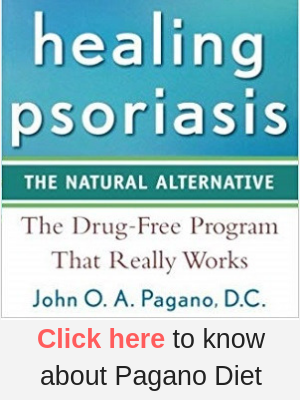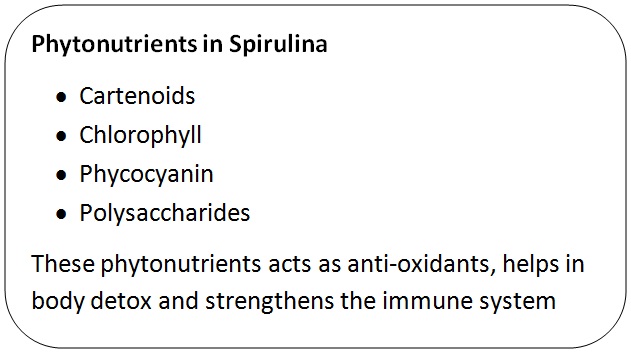A restrictive diet is certainly the most important aspect of holistic healing of psoriasis. A lot of times, we struggle to replace the “not to eat” foods with healthy alternatives. It results in nutritional deficiency in the long term which can actually aggravate the problem further. Dry spirulina is a natural food supplement which is densely packed with vital nutrients. It is completely safe to be consumed in the long term. In her book- Psoriasis healing from Inside Out, Heather has mentioned of eating spirulina along with other dietary supplements.
What is Spirulina
Spirulina, a type of blue-green algae, is an organism that grows in alkaline water- both in the sea (salt) as well as fresh water. It grows in various water bodies- lakes, ponds, rivers. These days, due to its splendid health benefits, it is grown in dedicated ponds for commercial production. In terms of Biology, it is a type of bacteria called as cyanobacteria. But, it contains chlorophyll (just like plants) and uses the process of photosynthesis to produce energy out of sunlight.
It is named so because of its spiral (spring) type physical appearance. Individual spirulina units grow in spiral structure and sticks to each other. It makes them easy to harvest.
The early age communities in Mexico and parts of Africa consumed spirulina as a primary source of protein. Use of spirulina as a food is in practice since the 9th century.
Nutritional content
Spirulina is considered as a ‘super food’ due to its high nutritional density. Let us look at the power packed nutritional content of this amazing green food:
Serving size- 7 grams (1 tablespoon)
By looking at the highlighted text, we can say that spirulina is a good food source of Protein, vitamin B complex, minerals (iron, manganese, copper) and Gamma-linolenic acid. Apart from all these nutrients, spirulina contains a unique combination of various phytonutrients. We would discuss about those phytonutrients in the later part of this article.
- Protein- Spirulina is 50 to 70% protein by weight. It is more than most of the protein rich foods available in the market
But, obviously, to get as much protein as from fish (or any other food in this list), you would need to eat spirulina the whole day, which is practically almost impossible. Hence, spirulina contains a splendid amount of protein. But, the standard dosage of 7 grams is going to make up for 8% of your daily requirement only.
But, the story doesn’t end here. The quality of protein contained in spirulina is better than most of the other protein rich foods. Spirulina contains all the essential 9 amino acids (amino acids are the building blocks of proteins). Protein contained in spirulina have no thick cell walls and hence it is highly digestible in nature. The net protein utilization is quite high, around 55 to 60%. People with a compromised body metabolism, as in case of psoriasis can easily digest the proteins contained in spirulina for body growth and development.
- Vitamin B complex– Spirulina can be termed as a natural multivitamin food. It contains good quantities of B complex vitamins, vitamin E, K with small quantities of vitamin A and C. It is worth mentioning here that spirulina doesn’t content any vitamin B12. It contains pseudovitamin B12 which can’t be used by humans.
- Minerals– Spirulina contains the whole range of minerals in good quantities. Iron is one of the most commonly deficient mineral in human bodies. Iron is required to form red blood cells in your body which can carry oxygen to various parts of your body. Standard serving (7 grams) of spirulina can provide you 11% of your daily requirement of iron. That’s a great news. Zinc, selenium, iron, copper, chromium, manganese- spirulina contains all these vital minerals.
- Gamma-linolenic acid (GLA)– GLA is an essential omega 6 fatty acid that your body can’t synthesize by itself and you need to look for external dietary sources to make up for it. GLA is provided by food sources (breast milk and spirulina) and essential oils (evening primrose oil, borage oil and black currant oil). GLA helps in psoriasis in many ways- repairing of leaky gut, reduction in inflammation, promoting weight loss by fat burning, regulating hormonal imbalance.
There is a confusion among people if spirulina is a better source of GLA than evening primrose oil. It is not right. One capsule (1000 mg) of evening primrose oil can provide around 90 mg of GLA. To get the same amount of GLA, you would need to consume almost 20 grams of spirulina everyday. This is too much. Hence, as far as GLA is concerned, evening primrose oil is a better option.
So, from where this confusion arises? The answer is- out of all the polyunsaturated fats contained in Spirulina, almost 25% is GLA where as in case of evening primrose oil, it is only 9%. Hence, some people mistakenly consider this conversion ratio as the final output of GLA. But, being a consumer, we should not bother about this conversion ratio. What attracts us is- how much GLA I would receive from a standard dosage and in this comparison, evening primrose oil is a clear winner.
Read more: GLA, Evening Primrose oil and Psoriasis
- Phytonutrients– Phytonutrients (or phytochemicals) are naturally occurring chemicals in plant foods. These phytonutrients give the dark green color to spirulina and provide a whole lot of benefits.
Benefits of Spirulina for Psoriasis
- Nutritious Super food– During holistic healing of Psoriasis, we undergo various detox programs followed by restrictive diet protocols. During detox programs, sometimes you lose vital nutrients from your body along with the waste materials (toxins). For example, during colon hydrotherapy (enema), you lose minerals from your body. Similarly, restrictive diets can sometimes lead to malnutrition because you are not replacing eliminated foods with healthy alternatives. To cater such situations, regular consumption of a natural super food such as spirulina is highly appreciable. It is natural, easy to consume and safe for long term consumption.
- Powerful anti-oxidant– Most of us know that blueberry is certainly one of the most powerful natural anti-oxidant. Due to its amazing brain protective properties, sometimes, people call it as brain berry. In a rat study, published in the magazine Experimental Neurology, three groups of rats were fed with diets enriched in blueberry, spinach and spirulina respectively. At the end of the study, it was concluded that brain protective power of spirulina was comparable to that of blueberry. Spirulina, thanks to various phytonutrients present in it, acts as a powerful anti-oxidant by gauging the production of free radicals to reduce inflammation and skin cell damage.
- Helps in Body Detox– Spirulina contains phytonutrients in a unique combination which helps in body detox. This process of detox accelerates when spirulina is taken during fasting. Chlorophyll is well known for its body detoxifying properties. Research studies conducted on rats in Japan illustrate that spirulina is seven times more effective than controlled diet in reducing kidney toxicity caused by heavy metal poisoning.
Read more: Body detox for Psoriasis
- Aids in Digestion– Spirulina helps in body detox including the digestive tract and hence reduces stress on the entire digestive system. Also, it helps in eliminating Candida by infusing healthy bacteria in your body and boosting your immune system. Spirulina promotes healthy bacteria like lactobacillus and bifidobacteria in your gut. Almost all the nutrients present in spirulina are easily absorbed by the body to make up for any nutritional deficiency. All these healthy activities result in improved digestion.
- Promotes weight loss– It is a well acknowledged that reduction in obesity/ body weight relieves psoriasis symptoms. Spirulina is very low in calories. The standard dosage of 7 grams provides only 20 calories. When you consume spirulina 20-30 minutes before your meal, the protein and other nutrients get absorbed by your body readily and ease down the hunger. Also, these nutrients boost up your internal body metabolism to break down the food more efficiently. It helps you to maintain a healthy body weight.
Read more: Obesity and Psoriasis
- Reduces Inflammation– Presence of GLA and phytonutrients make spirulina a powerful anti-inflammatory natural food.
- Improved body immunity– Due to rich iron content, spirulina stimulates the formation of red blood cells. It helps in strengthening the body immunity to fight infection and illness. If you are prone to cold and flu, regular consumption of spirulina can prove beneficial to you.
Additional Health Benefits
- Cardiovascular diseases– Spirulina helps in making the blood vessel more elastic to reduce blood clotting to check heart attacks. Also, it helps in controlling hypertension. An animal study (conducted on rabbits) concluded that regular consumption of spirulina can help in lowering triglycerides and LDL (the bad cholesterol) and increasing HDL (the good cholesterol).
- Allergic rhinitis is a nasal inflammatory condition characterized by symptoms such as nasal discharge, congestion and sneezing. Regular intake of spirulina can help in reducing these symptoms.
- Helps in the treatment of anemia by increasing hemoglobin content of red blood cells.
- Improves muscle strength and endurance
Dosage and How to consume
Spirulina is mainly available in two forms- dry powder and tablets. In general, powder form of spirulina is preferred over tablets. But, due to its pond scum like taste and intense flavor, some people opt for tablets.
Dry Spirulina Powder
You can take it directly with water or you can add it in your juices, green drinks and smoothies.
Standard dosage is 7 grams (1 tablespoon).
Don’t confuse tablespoon with teaspoon.
1 tablespoon= 3 teaspoons (approximate)
But, there is no universal standard size of teaspoons available. Also, the density (weight) of spirulina can depend on the supplier brand. Hence, the best way to standardize daily dosage is to make your own measurements. For example, if you have bought a 100 grams pack of spirulina, it would make 14 dosages of 7 grams each. After a few days of consumption, you would be able to measure your daily dose quite accurately.
Spirulina tablets
The other way of consuming spirulina is taking spirulina tablets. There are 1000 mg tablets available easily. But, it would take 7 tablets to meet the standard daily dosage which seems too much. Also, the tablets cost more than powder.
Hence, by and large, dry spirulina powder is the best way of consuming this super food. But, if the taste is a big deal for you, then go ahead for tablets.
To get the best results, you should consume it at least 20 to 30 minutes before the meals. This time gap would help your body to absorb all the nutrients (contained in spirulina) which would boost up your body metabolism and digest your meals better.
You can consume the whole amount in one go or you can split it in two or three installments. For example, half quantity each before lunch and dinner respectively OR consuming the whole amount before lunch.
Possible side effects
Spirulina is a natural food with a long history of consumption. It doesn’t have any side effects as such. But, to be on safer side, pregnant and breast feeding ladies and people with serious health concerns should consult their physician before consuming it.
During the initial days of consumption, you may experience one or more of below reactions:
- Mild Fever– The increased body metabolism due to high protein content can sometimes increase the body temperature.
- Stool turns dark green– The chlorophyll contained in spirulina helps in the removal of accumulated toxins. Also, chlorophyll itself is responsible for dark green color of spirulina. Hence, sometimes, you may witness color of your stool becoming dark green.
- Excessive gas and stomach ache– People with compromised digestive system can experience excessive passage of gas and stomach ache during initial days.
- Skin itching and breakout– Accelerated colon cleaning can initially cause skin itching and breakouts.
All these reactions are short lived and would dissolve gradually. To minimize the impact of these mild effects, start with 3 grams per day for initial two weeks and then increase it to the standard dosage of 7 grams a day.
Beware of contaminated Sripulina
Spirulina grows in water bodies, hence, the chances of contamination can’t be ignored. You should purchase only the contamination-free spirulina. Contaminated spirulina can cause mild to moderate complications such as liver problem, vomiting, nausea, stomach pain etc.
From where to buy
As mentioned earlier, it is very important to purchase contamination free spirulina of a trusted brand. Either you can buy it from an herbal store near to you or you can check the below Amazon links: –
| USA readers | India readers | UK readers | |
|---|---|---|---|
| Spirulina Powder | Click here | Click here | Click here |
| Spirulina tablets | Click here | Click here | Click here |
Conclusion
Spirulina is a natural super food, very low in calories but high in vital nutrients which can be easily absorbed by your body. On the path of holistic healing of psoriasis with restrictive diet, use of supplements such as spirulina assure that you don’t miss the daily intake of vital nutrients. Due to unique proportion of phytonutrients, spirulina acts as a body cleanser and anti-oxidant. Spirulina is not a cure for psoriasis, but, it can help accelerate the healing process when used in the long term. To avail the best benefits of spirulina for psoriasis, choose a pack of non contaminated spirulina powder/ tablets and consume it half an hour before the meals.
References
https://ndb.nal.usda.gov/ndb/foods/show/3306?fgcd=&manu=&lfacet=&format=&count=&max=35&offset=&sort=&qlookup=spirulina
http://www.ncbi.nlm.nih.gov/pubmed/15817266
https://en.wikipedia.org/wiki/Spirulina_(dietary_supplement)
http://antenna.ch/en/documents/AspectNut_UK.pdf
http://umm.edu/health/medical/altmed/supplement/spirulina




